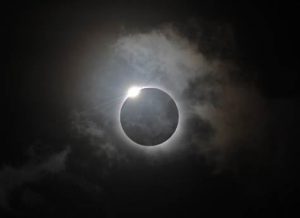The second solar eclipse of the year will be partially visible in Pakistan today. Islamabad, Lahore, Karachi, Peshawar, and Quetta will all be able to see it.

According to a statement released by the Met Department on Tuesday, Pakistan will be able to see a portion of the second solar eclipse of this year.
The Middle East, northern Africa, the majority of Europe, and western Asia will all be able to observe the solar eclipse.
The PMD also stated that the biggest eclipse would happen at 16:00 PST, with the partial eclipse starting at 13:58 PST and ending at 18:02 PST.
Islamabad, Lahore, Karachi, Peshawar, and Quetta would be able to see some of the astronomical spectacles.
Solar eclipses happen when the moon moves in front of the Sun and Earth, casting a shadow that falls on Earth.
A total solar eclipse occurs when the moon fully obscures the Sun’s disc, briefly casting the whole surface of the Earth in absolute darkness.
The Paris Observatory noted that the eclipse today is just part and that the “moon’s shadow will not touch the surface of the Earth at any point.”
Over Kazakhstan, the moon will only partially block the Sun at most (82%), which won’t be enough to reduce the brightness of the day, according to astronomer Florent Deleflie of the Paris Observatory.
“The Sun needs to be at least 95 percent veiled to start experiencing the impression of gloom in the sky, to detect a kind of cool light,” Deleflie told AFP.
Read NASA’s DART probe changes orbit of asteroid.
Experts advise not looking directly at the Sun, even through clouds, for those intending to view the eclipse in order to protect their eyes. Instead, safety glasses should be worn.
“We’ll observe that there is a tiny bit of the Sun missing. Although it won’t be spectacular, amateur astronomers always look forward to it because it can lead to stunning photographs “said Deleflie.
It will be the second solar eclipse of the year and the sixteenth overall.
According to NASA, the next complete solar eclipse will pass over North America on April 8, 2024.




















































